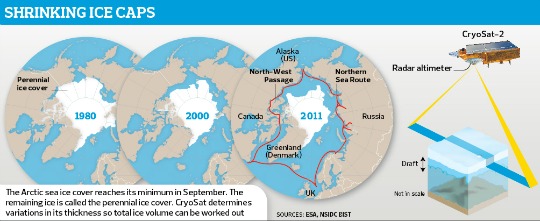Arctic Sea Ice Could Vanish In 10 Years: Study
By Common Dreams
15 August, 2012
CommonDreams.org
Arctic sea ice could completely vanish within 10 years, a rate much faster than previously thought, according to new measurements from the European Space Agency.
900 cubic kilometers of ice have disappeared every year since 2004, according to the study. The scientists used data obtained from NASA planes flying over the Arctic and submarines using sonar measurements from beneath the ice, combined with purpose-built satellite technology -- the CryoSat-2 probe -- the first of its kind to measure the thickness of Arctic ice.
"Very soon we may experience the iconic moment when, one day in the summer, we look at satellite images and see no sea ice coverage in the Arctic, just open water," Dr. Seymour Laxon, with London's Center for Polar Observation and Modelling, told the Guardian.
Not only has the area covered by summer sea ice in the Arctic rapidly shrunk, but the new measurements find that this remaining ice has also been thinning drastically.
The study suggests that Arctic ice is melting up to 50 per cent faster than earlier predictions.
Roughly 7,000 cubic kilometers of ice remained in the Arctic at the end of last summer, almost half the amount in 2004 which maintained 13,000 cubic km of sea ice.
As the arctic ice melts, ocean temperatures rise, melting methane deposits on the ocean floor and releasing large amounts of the greenhouse gas into the atmosphere accelerating the feedback loop process of climate change.
"With the temperature gradient between the Arctic and equator dropping, as is happening now, it is also possible that the jet stream in the upper atmosphere could become more unstable. That could mean increasing volatility in weather in lower latitudes, similar to that experienced this year," Professor Chris Rapley of UCL told the Guardian.
Comments are moderated



